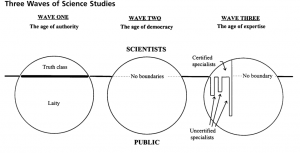
If SFU were to be attacked by an army of alien robots, which Avenger would we need to call? Would it be the rich genius? The green (not) genius? The God? The wizard? The spy? The archer? This interrogatory-like line of questioning has one goal in mind: trying to determine what’s the difference among them, and more specifically, who ranks best for SFU’s protection.
Whereas we all might agree that all Avengers are superheroes, the first fight of Avengers Age of Ultron hints at my exact predicament: “Concentrate fire one the weak ones”. There are strong and weak ones, being the latter vulnerability for the whole. While the technoscience folks will appreciate the analogy to superheroes, the purpose of this analogy is to present the third wave of STS.
The whole point of thinking about strong and weak heroes is because there is a line that needs to be drawn (however difficult) among them. It’s impossible for someone to acquire the God nature of Thor, Captain America’s serum or Tony Stark’s technology. On the other hand, the skills of Black Widow and Hawkeye are not that far (says the graduate student) away. Especially when considering that expertise is reachable through 10K to 20K hours of deliberate practice, and the strong regimens that young athletes undergo to become Olympic champions.
So, when thinking about the world of experts, in terms of SFU-protecting capabilities, one can discern differences in expertise. When pulling the lens away, other actors enter the scene, there is the SFU safety personnel, as well as the mall guards. Furthermore, there are also those who might feel heroic or compelled to fight the robot invasion, and those students who just happened to be there. The point I want to convey is that while it is clear to contrast the differences in world-saving expertise between the Avengers and SFU students, to what point should all be taken into account for discussions regarding the rebellion (yes, there is a rebellion now).
When looking at technoscience, the second wave dealt with that exact same problem. As coined by Collins, STS dealt with the “Problem of Legitimacy”. Science had underperformed in various instances under the public eye and people started to question the holy link that technoscientists claimed to have to truth (Collins, 2002). Cases such as the current anti-vaccination campaigns and GMOs arose because consensus hadn’t been achieved in their respective scientific fields. People were starting to become more engaged and with Google as an ubiquitous encyclopedia, it became easier for people to try to find their own answers. Science started to become democratized.
Returning to the rebellion, it becomes clear that only those with expertise in military defense (alien military defense preferably) should be in charge of management. It would be unwise to assume that our expertise in SIAT research is directly translatable to military strategies. Yet to what extent does the voice of the SIATvivors count for military maneuvers, and most importantly what if those tactics fail?
That’s the line of questioning that the third wave of STS tries to address, it deals with the Problem of Expertise. The aim of the third wave is to build upon the foundations of the second wave without returning (and contradicting itself) to the root of wave one. In short, how to best make technical decisions for the SIATvivors when the alien military strategies department is still in diapers. Going back to initial line of questioning, it becomes important to define expertise in order to know who to consult to make the best decisions. Furthermore, expertise is to be understood as something specific rather than generalizable. Scientific expertise is not a unisize shirt that fits everyone alike across disciplines. On the other hand, expertise isn’t confined to certified specialists, but also to those who have empirical expertise which equates their certified counterparts.
When thinking about which Avenger to call, let’s use the approach of the third wave of STS and consider only those who have experience in fighting alien robots or any directly translatable expertise, such as fighting robots (did I already mention Age of Ultron?).
References:
Collins, H. M., & Evans, R. (2002). The third wave of science studies: Studies of expertise and experience. Social Studies of Science, 32(2), 235–296. https://doi.org/10.1177/0306312702032002003
Ericsson, K. A., Krampe, R. T., & Tesch-Römer, C. (1993). The role of deliberate practice in the acquisition of expert performance. Psychological review, 100(3), 363.
Leave me a Comment